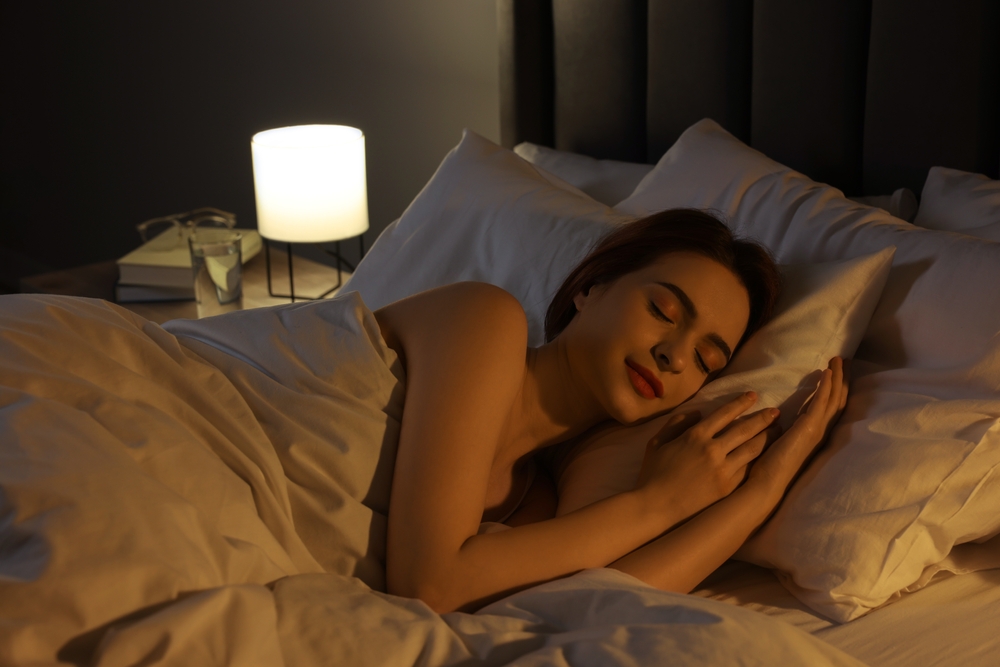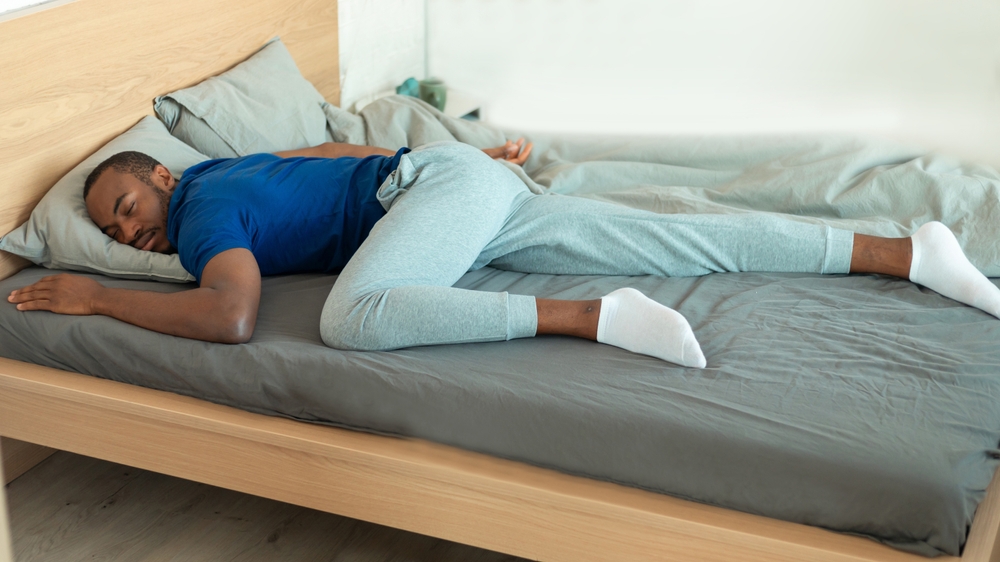How to Train Yourself to Sleep on Your Side
- Choose a good pillow and mattress
Find a pillow well-suited to your collarbone structure.
Ensure the pillow is firm enough to support the neck.
Mattresses must often be softer to prevent pressure from building in the shoulders and hips.
- Use pillows as barriers and supports
Put a pillow between your knees to support your hips and lower back
You can also hug a pillow to comfortably rest your upper arm.
Invest in body pillows to maintain your position.
Sew a tennis ball onto the back of a shirt to prevent yourself from rolling over.
- Sleep on the couch at first
Couches are often narrow and only have room for side sleeping anyway.
Disadvantages of Sleeping on Your Side

Source: Shutterstock
Beautiful young woman sleeping in bed at night
Although this position could provide many benefits, it’s not for everyone, especially those who use mattresses and pillows that make side sleeping uncomfortable. These disadvantages include:
Pain in the shoulders and hips
Side sleeping on too-firm mattresses could increase pressure on the shoulders, hips, and knees. However, too-soft mattresses could cause the spine to go out of alignment and also cause pain.
Pressure in the face
People with sinus congestion and glaucoma may experience painful or uncomfortable pressure in their faces when they lie on their sides. Additionally, it could worsen a tight or stiff jaw.
The Benefits and Disadvantages of Other Sleeping Positions

Source: Shutterstock
Ultimately, people should sleep in any way they feel most comfortable. But it’s important to consider how your sleep position could affect your body, for better or worse. You could also begin your nights on your left side and allow your body to assume whatever position it prefers. Also, sleeping on the right side also comes with benefits, so don’t stress about trying to retrain yourself if it’s not coming easily. Similarly, there are pros and cons to sleeping on the back and stomach.
Sleeping on your back
Young man lying on bed with orthopedic pillow at home
Benefits – It may help with:
- Hip pain
- Knee pain
- Arthritis
- Fibromyalgia
- Sinus congestion
- Bursitis

Source: Shutterstock
Tips:
- Place a pillow under your knees to support the spine and lower back.
- Spread the legs and arms out to reduce pressure on the joints.
- Choose a pillow that offers good support for the neck, and avoid the ones that tilt your chin toward your chest.
- Elevate the head with extra pillows or a wedge pillow to help reduce heartburn, headaches, and sinus buildups.
Sleeping on your stomach
Black Guy Sleeping Lying On Stomach On Bed In Bedroom Indoor. Millennial Man Resting Napping Peacefully At Home. Healthy Sleep, Rest And Relaxation Concept. Panorama
Unfortunately for those who enjoy this position, experts warn against it. “If you are sleeping on your stomach and notice you are suffering back pain, there probably is a reason,” says Bill Fish, a certified sleep science coach. “Since the majority of the weight of the human body is around your center, that core pushes into the sleep surface further and basically puts strain on your spine in the wrong direction, causing back and neck pain.”
Still, here are some tips for those who can’t switch to their side:
- Use a flat pillow or none at all.
- Don’t tuck your arms under your pillow or head, since this could cause arm numbness or shoulder joint pain.
- Alternate the sides of your head to avoid neck pain.
- Don’t lift your leg to one side with a bent knee since this could worsen back issues.
Conclusion
At the end of the day, the “best” sleeping position is the one that leaves you feeling rested, refreshed, and free of aches and pains. But if you’re experiencing issues like back pain, snoring, digestive troubles, or brain fog, it may be worth giving left-side sleeping a try.
With a little experimentation and the right adjustments to your sleep setup, you could unlock a whole host of surprising health benefits. Who knows – it may just change the way you think about getting a good night’s rest.